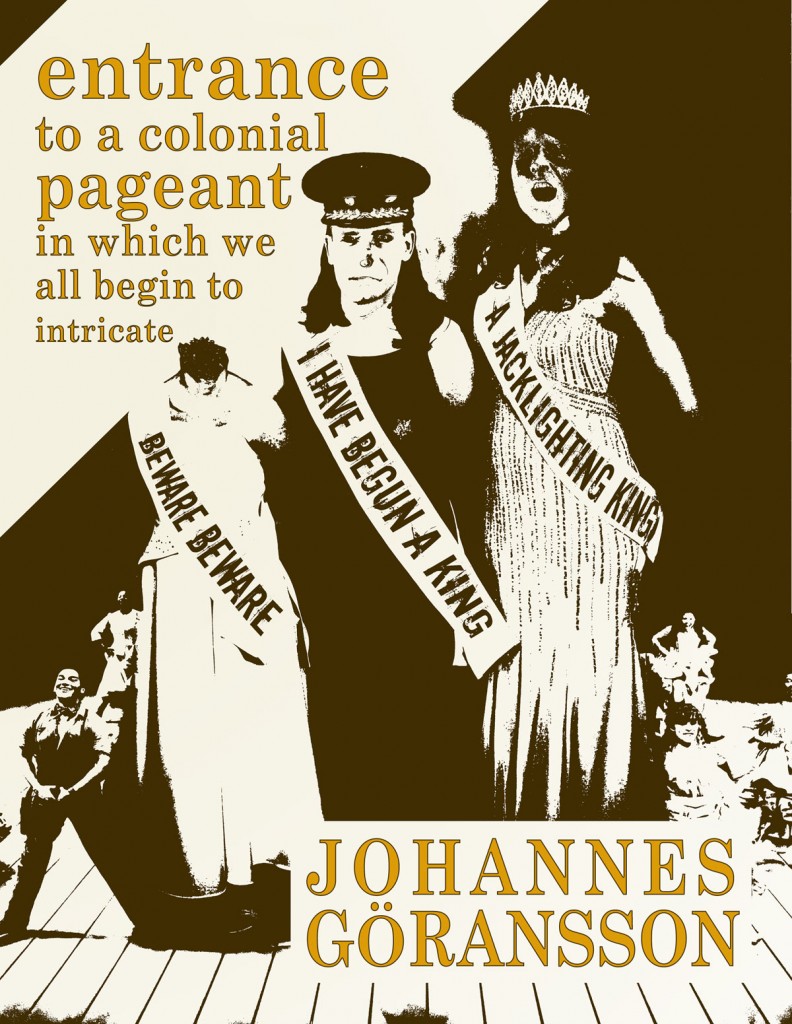
Entrance to a colonial pageant in which we all begin to intricate
Johannes Göransson
Fiction / Poetry / Drama
5.5″ x 7″, 100 pp., pbk.
May 2011 | ISBN: 9780982541654
Click here to look inside the book
$14 includes shipping in the US
(vs. $16 + $3.99 elsewhere)
Order by check
[wp_cart_button name=”Goransson, entrance to a colonial pageant” price=”14″]
A Small Press Distribution Bestseller!
Responsible for at least one arrest!
Contains a gore so massive you will either shower or move the book to the other side of the bedroom upon opening its cover…. Body parts, body styles. Genitalia as fashion, as construct, as exploit. Göransson takes Judith Butler’s theory of gender performativity and blasts it with skin-made dynamite. He creates such a mess of appendages, desires, and impulses that the taglines of Queer Theory or Gender Studies seem antiquated compared to the blurring of binaries to be found in this work. It is a new thing. Göransson has managed to produce a discomfiting, filthy, hilarious, and ecstatic piece of literature that is cocked and ready.
—Lorian Long, Bookslut
A hybrid form somewhere between or among the categories of poetry, prose, essay, theatre production, and instruction manual. . . . There is much in the absolute inability of this production to be realized in physical terms and space which leads us to see a relationship to an Artaudian Theatre of Cruelty being played out. There are masks and intricate costumes aplenty, from the infamous sacks worn by Guantanamo detainees seen in the earlier passage being worn by THE PASSENGER, to the recurring “Pussy” costume fabricated “from Charlotte Bronte’s gauzes”(42). There are dresses made from looted items, prison-style clothes, black and polished bodies, cowboy costumes, skins charred from suicide bombings, heaps of dead horses, birds bursting from bodies, wounds, basketball jerseys on androgynous children, kissing faces and murder victims, exoskeletons, audience members in whiteface, and many more get ups. The costumes sometimes act/exist as characters in and of themselves, and sometimes they are affixed to bodies which are keen on morphing and wrecking any attempt at stability or a false sense of character development. What develops is the spectacle. It is a pile up of sequined things and fleshy things. . . . The audience is often implicated. After all, torture and interrogation is not borne out of individual will and action alone. . . . All aboard.
—Ryan Downey, HTML Giant
Like a mad scientist throwing together unexpected chemicals, Göransson delights in coupling divergent concepts, seeing which combinations smoke, sizzle, or explode…. Beneath the words there is an undulating rhythm, at first comforting, then unnerving, then both simultaneously. Layered over familiar syntax, startling images are made more startling still.
—Erin Becker, MAKE Magazine
Goransson pays the ultimate penance and shoulders the heaviest burden: to reflect a culture accurately, no matter how disfigured. His art drinks deep of the disease it most fears so that we can learn more from his symptoms. He’s the Poet Laureate of the Coal Mine, our savior canary, dying and producing perpetually death-obsessed art that we might all be spared. So for all its ugliness—all its child predators and body dysmorphia, its castrations, its Ronald Reagans, its hate crimes and artists and anorexia, everything—Entrance is the dubious gift of the diagnosis we’ve been too afraid to confront on our own. It’s embarrassing, it’s frightening, but it’s also potentially the long-neglected first step in addressing a major disease.
—Nick Demske
[Entrance to a colonial pageant] demands its reader to engage it on a close sentence-to-sentence level and rewards the reader with some truly spectacular prose. Prose that, page after page, begins to infect the reader, begins to parasite the reader as host, parasite the host’s inner child . . . before immolating the host, the reader.
—Joseph Michael Owens, PANK Magazine
This is a terrifying world we have entered, one that might be likened to a frenzied America souped-up with steroids, LSD, and the rhetoric of fear. . . . The culture in which the drama is set is one with a notable amount of xenophobia. The Passenger undergoes a mandatory cerebral operation, assisted by a nurse who perceives this passenger as a threat to children and society as a whole. . . . Goransson’s prose is obsessive, feverish; it feels as if there is simultaneously an overwhelming joy and a keen aversion that animates his descent into the language inhabited by the characters. . . . This pageant is ultimately redemptive—in a world where much is hidden and persecuted, all parties involved are catapulted into a liminal state that requires a confrontation of the concealed/uncanny. Instead of accepting the paternal law as such, we must create our own, while allowing for a multiplicity of laws to flourish and coexist.
—Drew Krewer, Mars Poetica
I don’t know where else you could contract the plague in these words but by ten TVs at once. On the TVs play: Salo, the weather channel, 2x Fassbinder (any), Family Double Dare, ads for ground beef, blurry surgical recordings, porno, porno, Anger (all). An 11th TV right behind you will show you yourself reading to the backside of your head. You’ll need a machine gun and a body double. You will not feel your disease: as here these words bring such high pleasure: this malaria is fun. It’s also fidgety, petrifying, elegantly rash, giddy, stunned. Burroughs and Genet and ‘Pac are dead. Long live Goransson.
—Blake Butler
It would take a miracle to perform this pageant. For a start, you would have to reanimate Charlotte Brontë, Adolf Loos, and Ronald Reagan, and you would need an ungodly amount of wax. Most of the action is obscene, and therefore takes place offstage. The actors enter and report on scenes of spectacular violence that go on all the time every day. The audience is part of the spectacle too. We are all transformed into images somewhere in this script. At one point, all of Hollywood appears onstage on the form of dead horses, perhaps because Hollywood film continues to rely on narrative conventions that it exhausted long ago. The entire world also appears, played by a boy who, in a series of rapid costume changes, puts on increasingly pretty dresses.
—Aaron Kunin
Voluptuous, turbulent, and focused, inventive and strictly faithful to the performative instability of our queer moment, Johannes Goransson’s new book brings page and stage together in order to put genre (and gender) to a series of on-going tests. Here body and body of work (inextricable) are in a critical condition: subject to an invasive and relentless interpretation producing excessive, unruly ‘truths.’ Here the debased coin of feeling is rung hard and the ‘Authenticity kitsch’ of an easily accepted idea of the poetic is returned for a better metal, mined from a deeper vein. The love child—in this book at least—of Sylvia Plath and Antonin Artaud (if one can assign parentage at the end of an orgy?), Goransson gives us realisms complicated and fast enough to believe in. Entrance to a colonial pageant in which we all begin to intricate is an immensely important and absolutely thrilling experience. Read this! ‘Something tells me he is the poet of social justice. Peekaboo!’
—Laura Mullen
about the author
 In addition to his Tarpaulin Sky titles, Haute Surveillance and Entrance to a colonial pageant in which we all begin to intricate, Johannes Göransson has published three other books of his own writings—A New Quarantine Will Take My Place, Dear Ra, Pilot (“Johann the Carousel Horse”)—and several books in translation, including Dark Matter and With Deer by Aase Berg, Ideals Clearance by Henry Parland, and Collobert Orbital by Johan Jönson.
In addition to his Tarpaulin Sky titles, Haute Surveillance and Entrance to a colonial pageant in which we all begin to intricate, Johannes Göransson has published three other books of his own writings—A New Quarantine Will Take My Place, Dear Ra, Pilot (“Johann the Carousel Horse”)—and several books in translation, including Dark Matter and With Deer by Aase Berg, Ideals Clearance by Henry Parland, and Collobert Orbital by Johan Jönson.